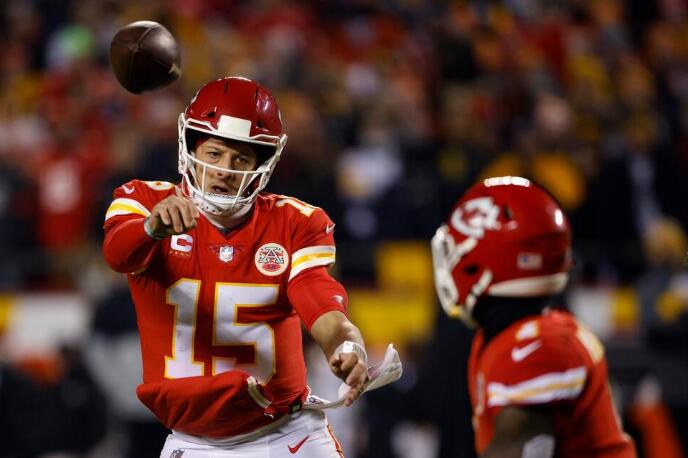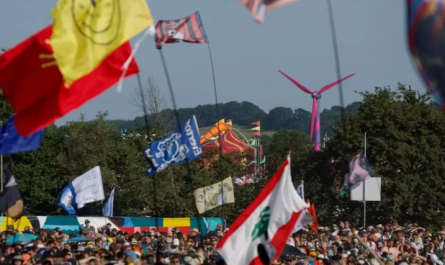King Charles and Queen Camilla’s tour of Australia has reignited the debate about the role of the monarchy in the country.
The visit to Australia and Samoa is the King’s biggest overseas trip since he began treatment for cancer in February.
He resumed public duties in April after a temporary pause following his diagnosis.
What does the King do?
The King is the UK head of state, but his powers are largely symbolic and ceremonial. He remains politically neutral.
He receives daily dispatches from the government in a red leather box, including briefings ahead of important meetings, or documents needing his signature.
The prime minister normally meets the King on a Wednesday at Buckingham Palace.
These meetings are completely private, and no official records are kept of what is said.
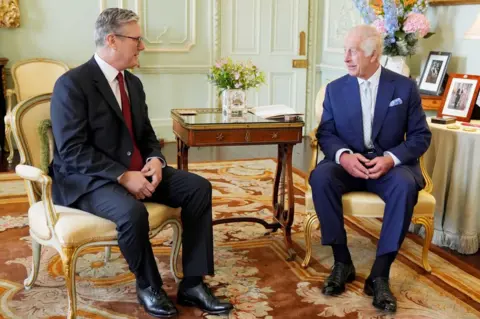 Getty Images
Getty ImagesThe King also has a number of official parliamentary roles:
- Appointing a government – the leader of the party that wins a general election is usually called to Buckingham Palace, where they are invited to form a government. The King also formally dissolves Parliament before a general election
- State Opening and the King’s Speech – the King sets out the government’s plans in a speech delivered from the throne in the House of Lords
- Royal Assent – when a piece of legislation is passed through Parliament, it must be formally approved by the King in order to become law. The last time Royal Assent was refused was in 1708
He also leads the annual Remembrance event in November at the Cenotaph in London.
As well as hosting visiting heads of state, the King regularly meets foreign ambassadors and high commissioners, and carries out regular foreign visits.
The King is also head of the Commonwealth, an association of 56 independent countries spanning 2.5 billion people.
He is head of state for 14 of these, known as the Commonwealth realms, as well as the Crown dependencies – the Channel Islands and the Isle of Man.
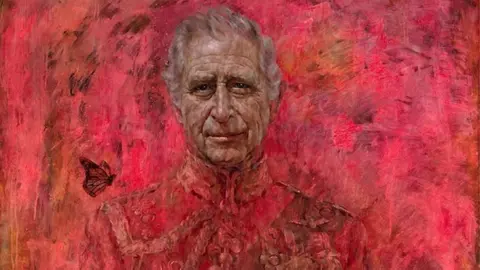 Jonathan Yeo Studio
Jonathan Yeo StudioCharles also confers official honours on people from all walks of life, in public recognition of their merit, service or bravery. Most honours are awarded at new year and on the monarch’s official birthday, in June.
The King is also patron to a number of organisations, including the RNLI, the Samaritans, RAF Museum, the Yorkshire Agricultural Society, the Penny Brohn cancer charity and the Royal Liverpool Philharmonic Society, Orchestra and Choir.
The Queen also holds a number of patronages, including the Royal Literary Fund, the Royal Academy of Dance, the Royal Voluntary Service and the Army Benevolent Fund, and undertakes her own public engagements.
How did King Charles’s cancer diagnosis change his duties?
King Charles was diagnosed with cancer in February 2024, and began treatment shortly afterwards.
Although he withdrew from public events in the weeks after his cancer was revealed, the King continued with his constitutional role as head of state, completing paperwork and holding private meetings.
His weekly sessions with the prime minister also carried on.
The King’s first major public appearance after his diagnosis was on Easter Sunday, when he and the Queen greeted crowds after a church service in Windsor.
He resumed his public duties at the end of April, when he visited a cancer treatment centre with Queen Camilla.
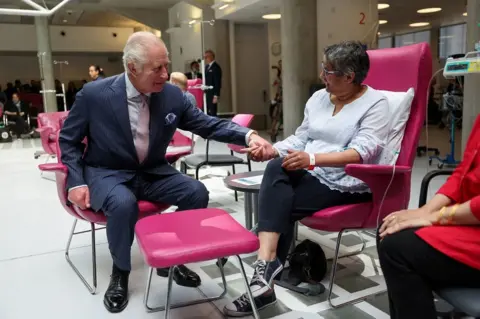 PA Media
PA MediaHe also made a surprise visit to an army barracks in Hampshire, where he joked about having been “allowed out of my cage”.
In June he attended the Trooping of the Colour ceremony, where Catherine, Princess of Wales, made her much anticipated first public appearance after her own cancer diagnosis.
What happened during the King’s Australia trip?
The King and Queen visited Australia before travelling to Samoa for the Commonwealth heads of government meeting (CHOGM).
An accompanying trip to New Zealand was scrapped after medical advice, and the King’s itinerary has been structured to take account of his health.
The visit prompted further discussion about the future of the monarchy in Australia. A 1999 referendum failed to win a majority for becoming a republic, but public support for the movement has grown since then.
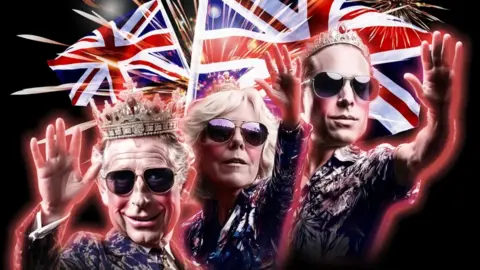 ARM
ARMAustralian Prime Minister Anthony Albanese is a long-term republican, but his government paused plans to hold another vote in January 2024, saying it was no longer a priority issue.
When he addressed the Australian parliament, the King was heckled by Aboriginal senator Lidia Thorpe, who accused him of genocide.
He was not her king or “of this land”, she told BBC News.
Some Indigenous leaders criticised her protest, after a drawing depicting the King beheaded alongside his crown appeared, briefly, on her social-media account.
The senator later apologised, saying it had been posted by a staff member without her knowledge.
Ahead of the trip, the King said the question of “whether Australia becomes a republic” was a “matter for the Australian public to decide”.
Who else is in the Royal Family?
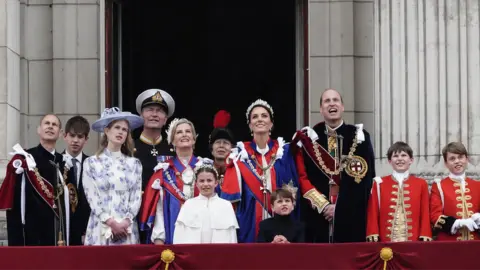 PA Media
PA Media- Prince William is the elder son of King Charles and his first wife, the late Princess Diana. After the death of Queen Elizabeth, he became the Prince of Wales and Duke of Cornwall while retaining his previous Duke of Cambridge title. He is married to Catherine, Princess of Wales and Duchess of Cornwall and Cambridge. They have three children: Prince George, Princess Charlotte and Prince Louis
- The Princess Royal (Princess Anne) was the Queen’s second child and only daughter. She is married to Vice Admiral Timothy Laurence and has two children with her first husband, Captain Mark Phillips: Peter Phillips and Zara Tindall
- The Duke of Edinburgh (Prince Edward) was the Queen’s youngest child. He is married to the Duchess of Edinburgh (Sophie Rhys-Jones). They have two children: Lady Louise and James, Earl of Wessex
- The Duke of York (Prince Andrew) was the Queen’s second son. He has two daughters with his former wife, the Duchess of York (Sarah Ferguson): Princess Beatrice and Princess Eugenie. Prince Andrew stepped down as a “working royal” in 2019 after a controversial BBC Newsnight interview about allegations that he had sexually assaulted Virginia Giuffre. In February 2022, he paid an undisclosed sum to settle the civil sexual assault case which Ms Guiffre brought against him in the US
- The Duke of Sussex (Prince Harry) is William’s younger brother. He is married to the Duchess of Sussex (Meghan Markle). They have two children: Prince Archie and Princess Lilibet. In 2020, they announced they were stepping back as senior royals and moved to California
Camilla, William and Kate receive royal honours
How does succession work and who is King Charles’s heir?
The order of succession sets out which member of the Royal Family takes over as monarch when the existing one dies or abdicates.
First in line – the heir to the throne – is the monarch’s eldest child. Sons no longer take precedence over their older sisters.
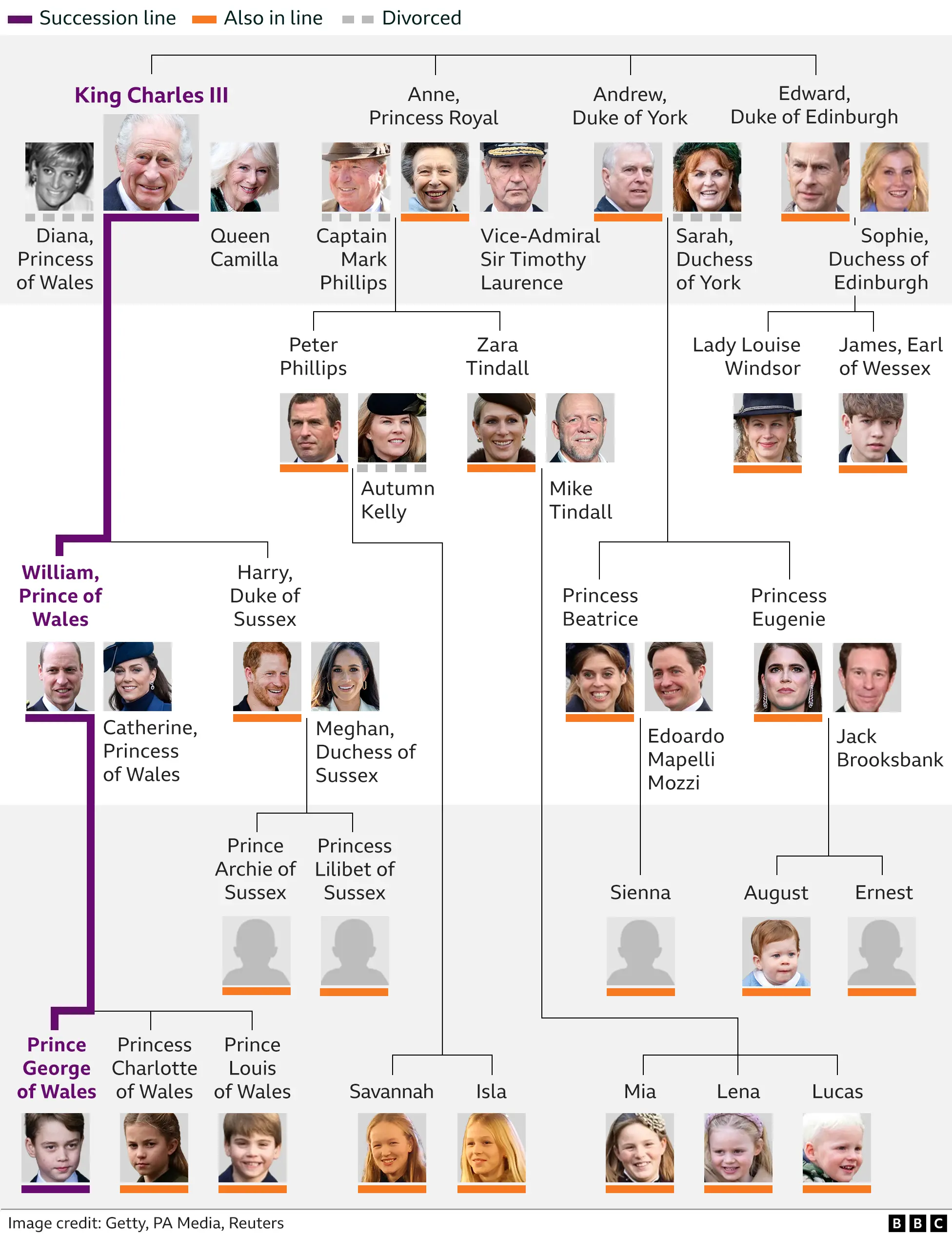
King Charles’s heir is his elder son, the Prince of Wales.
William’s eldest child Prince George, is second-in-line to the throne, and his daughter Princess Charlotte is third. Her younger brother Prince Louis is fourth and Prince Harry is fifth.
- Royal Family tree and line of succession
- Why did Harry and Meghan leave the Royal Family?
Where does the Royal Family get its money?
The Royal Family receives an annual payment from the taxpayer, known as the Sovereign Grant, which is used to pay for official expenses, such as the upkeep of properties and staff costs.
The amount is based on a proportion of the profits of the Crown Estate, a £15.5bn property business owned by the monarch, but run independently.
The Sovereign Grant is worth £86.3m for 2024-2025, as it was in the previous three years, although the Royal Family’s total spending was more, with the difference covered by reserves.
To keep the annual payment at the same level, the grant is now a smaller percentage of Crown Estate profits.
But those profits have now been boosted by six new offshore wind farms, making the grant worth £132m in 2025-26 – even under the reduced formula.
Without the reduction, the monarchy would have received £275m.
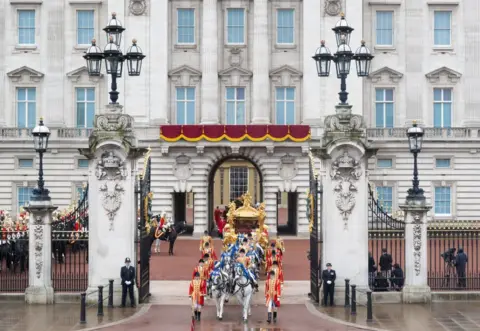 Getty Images
Getty ImagesThe King also receives money from a private estate called the Duchy of Lancaster, which is passed down from monarch to monarch. It covers more than 18,000 hectares of land, including property in central London. Worth £646m, it generated £27.4m in profits in the year to 31 March 2024.
The Duke of Cornwall (currently William, Prince of Wales) benefits from the Duchy of Cornwall, which mainly owns land in the south-west of England. Worth £1.1bn, it generated a net surplus of £23.6m in the year to 31 March 2024.
The King and William receive the profits from the duchies personally, and can spend the money as they wish. Both voluntarily pay income tax on the proceeds.
Some Royal Family members have private art, jewellery and stamp collections which they can sell or use to generate income as they wish.
- Where do Harry and Meghan get their money?
What happened at the Coronation?
Charles became King on the death of his mother, Queen Elizabeth II, on 8 September 2022.
On 6 May 2023, Charles and his wife Camilla were crowned by the Archbishop of Canterbury in front of more than 2,000 guests, including global politicians, fellow kings and queens, religious leaders, celebrities and community champions.
Crowds lined the streets of central London to watch the King and Queen return to Buckingham Palace in a mile-long procession.
Two months later, the King was presented with the Scottish crown jewels, in a special service of thanksgiving at St Giles’s Cathedral, in Edinburgh.
Where do the Royal Family live?
The King and Queen’s official residence, Buckingham Palace, is having a 10-year £369m refurbishment. As a result, they split their time between Clarence House in London and Highgrove in Gloucestershire.
Other Royal residences include Windsor Castle, Sandringham in Norfolk, the Palace of Holyroodhouse in Edinburgh and Balmoral Castle in Aberdeenshire.
In August 2022, the Prince and Princess of Wales moved from Kensington Palace in west London to live in Adelaide Cottage, on the Windsor Estate.
How popular is the Royal Family?
A 2023 YouGov opinion poll of more than 2,000 adults in Britain ahead of the first anniversary of Queen Elizabeth’s death suggested a sharp generational divide.
Overall, 62% wanted to keep the monarchy, with 26% backing an elected head of state – up from 17% a decade earlier.
But while 80% of the over-65s supported the monarchy, only 37% of 18-to-24-year-olds agreed.
There was also less support for the royals in Scotland or Wales than in England.
